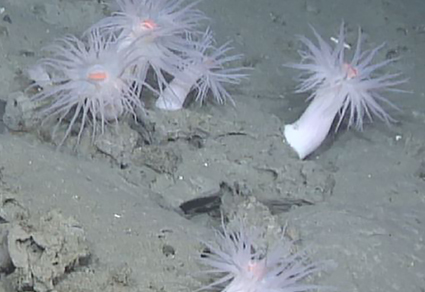References
Boland, G.S., Etnoyer, P.J., Fisher, C.R. & Hickerson, E.L. (2017) State of deep-sea coral and sponge ecosystems of the Gulf of Mexico Region. In: Hourigan, T.F., Etnoyer, P.J. & Cairns, S.D. (Eds.), The State of Deep-Sea Coral and Sponge Ecosystems of the United States. NOAA Technical Memorandum NMFS-OHC-4. NOAA, Silver Spring, Maryland, pp. 1–58. [https://swfsc-publications.fisheries.noaa.gov/publications/CR/2017/2017Clarke.pdf]
Brooke, S.D., Watts, M.W., Heil, A.D., Rhode, M., Mienis, F., Duineveld, G.C.A., Davies, A.J. & Ross, S.W. (2017) Distributions and habitat associations of deepwater corals in Norfolk and Baltimore canyons of the Mid-Atlantic Bight, USA. Deep Sea Research II, 137, 131–147.https://doi.org/10.1016/j.dsr2.2016.05.008
Carlgren, O. (1918) Die Mesenterienanordnung der Halcuriiden. Kungliga Fysiografiska Sällskapets Handlingar, 29 (29), 1–37.
Ehrenberg, C.G. (1834) Beiträge zur physiologischen Kenntniss der Corallenthiere im allgemeinen, und besonders des rothen Meeres, nebst einem Versuche zur physiologischen Systematik derselben. Abhandlungen der Königlichen Akademie der Wissenschaften, Berlin, 1, 225–380.
Fautin, D. (2016) Catalog to families, genera, and species of orders Actiniaria and Corallimorpharia (Cnidaria: Anthozoa). Zootaxa, 4145 (1), 1–449.https://doi.org/10.11646/zootaxa.4145.1.1
Hertwig, R. (1882) Die Actinien der Challenger Expedition. Gustav Fischer, Jena, 119 pp.
Hoeksema, B.W. & Cairns, S. (2022) World list of Scleractinia. Lophelia Milne Edwards & Haime, 1849. World Register of Marine Species. Available from: https://www.marinespecies.org/aphia.php?p=taxdetails&id=135095 (accessed 17 November 2022)
International Commission on Zoological Nomenclature (1999) International Code of Zoological Nomenclature. 4th Edition. International Trust for Zoological Nomenclature, London, 306 pp.
McMurrich, P. (1893) Report on the Actiniae collected by the United States Fish Commission Steamer Albatross during the winter of 1887–1888. Proceedings of the United States National Museum, 16, 119–216.https://doi.org/10.5479/si.00963801.16-930.119
McMurrich, P. (1898) Report on the Actiniaria collected by the Bahama Expedition of the State University of Iowa, 1893. Bulletin from the Laboratories of Natural History, State University of Iowa, 4, 225–249.
McMurrich, P. (1901) Contributions on the morphology of the Actinozoa VI. Halcurias pilatus and Endocoelactis. Biological Bulletin, 2, 155–163.https://doi.org/10.2307/1535781
Meyer, K.S., Brooke, S.D., Sweetman, A.K., Wolf, M. & Young, C.M. (2017) Invertebrate communities on historical shipwrecks in the western Atlantic: relation to islands. Marine Ecology Progress Series, 566, 17–29. https://doi.org/10.3354/meps12058
Milne Edwards, H. & Haime, J. (1849) Mémoire sur les polypiers appartenant a aux groups naturels des zoanthaires perforés es des zoanthaires tabulés. Comptes rendus hebdomadaires des séances de l’Académie des sciences, 29, 257–263.
Rodríguez, E., Mendoza, M. & Häussermann, V. (2013) New records and redescription of Halcurias pilatus and Halcurias mcmurrichi (Actiniaria, Endocoelantheae). Journal of the Marine Biological Association of the United Kingdom, 93, 2089–2100.https://doi.org/10.1017/S0025315413000775
Rodríguez, E., Barbeitos, M., Brugler, M.R., Crowley, L., Gusmão, L., Häussermann, V., Grajales, A, Reft, A. & Daly, M. (2014) Hidden among sea anemones: The first comprehensive phylogenetic reconstruction of the order Actiniaria (Cnidaria, Anthozoa, Hexacorallia) reveals a novel group of hexacorals. PLoS ONE, 9 (5), e96998.https://doi.org/10.1371/journal.pone.0096998
Stephenson, T.A. (1922) On the classification of Actiniaria. III. The Quarterly Journal of Microscopical Science, 66, 247–319.https://doi.org/10.1242/jcs.s2-66.262.247
Uchida, H. (2004) Actinologica Japonica (1) on the actiniarian family Halcuriidae from Japan. Kuroshio Biosphere: Bulletin of the Biological Institute of Kuroshio, 1, 7–26.
Uchida, H. (2007) Actinologia Japonica (2) on the actiniarian family Actinernidae from Japan. Kuroshio Biosphere: Bulletin of the Biological Institute of Kuroshio, 3, 17–32.


